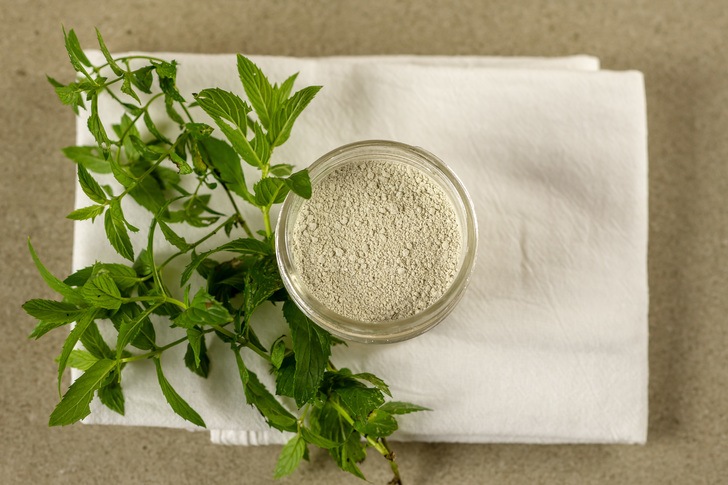
Everyone likes a bright, healthy smile. However, using over-the-counter teeth brightening creams or even getting a whitening treatment from your dentist is expensive and, honestly, scary.
These bleaching treatments contain a hodgepodge of high-strength chemicals that can make teeth more sensitive and can permanently damage the tooth enamel and gum tissue if overused.
There is good news.
There are natural ways to whiten teeth, keep them healthy, and remineralized using non toxic ingredients.
Watch this one minute video on how to make this easy but effective too whitening powder.
Ingredients:
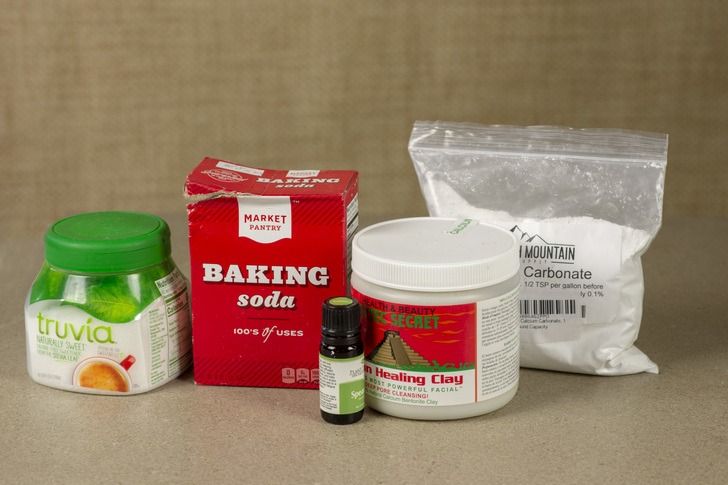
- 4 tablespoons bentonite clay
- 3 tablespoons calcium carbonate powder
- 1 tablespoon baking soda
- 1 tablespoon or more of stevia
- a few drops peppermint or spearmint essential oil
Why We Used These Ingredients:
The ingredient list does seem like an odd assortment to put together to clean and whiten teeth. However, it’s nothing compared to the laundry list of chemicals that’s in conventional toothpaste.
Bentonite Clay
Bacteria and toxins can quickly build up in the mouth, leading to impaired oral health, and even demineralized teeth. The demineralization of teeth is caused by a regular exposure of acids to your tooth enamel from the accumulation of bacterial plaque.
Bentonite clay is a natural, gentle cleanser, rich in minerals which can support tooth remineralization. It contains numerous nourishing elements such as calcium, magnesium, and silica that help to draw out heavy metals and toxins from the mouth.
Bentonite clay’s detoxifying properties not only reduce the level of mouth bacteria but can also help freshen breath and fight gum disease, while it’s absorptive benefits help remove stains from teeth over time.
Read Next: 11 Reasons You Should Put Bentonite Clay On Your Face + More Uses
Calcium Carbonate
This mineral, found in various rocks such as chalk, limestone, and marble, serves to polish teeth and restore them to full vibrancy.
It works by abrasion to target each tooth individually and remove built-up stains without harming tooth enamel. Its delicate scrubbing nature removes surface plaque and safely strips teeth of any trace of food or drink.
Plus, calcium carbonate also aids in the remineralization of teeth by giving your teeth the necessary calcium they require.
Baking Soda
Baking soda is one of the most common alternative toothpaste options and is even becoming popular among mainstream toothpaste producers as an added ingredient for extra whitening power.
This well-known powder works as a mild abrasive agent that gently removes plaque and creates an alkaline environment in the mouth to help eradicate bacteria.
Toothpaste that contains baking soda for buffing out surface stains has been shown to be more effective as a teeth whiteners than non-baking soda toothpaste. Keep in mind that there is no evidence to prove the veracity of baking soda on old tooth discoloration that is deeply engrained in enamel.
Peppermint Essential Oil
Peppermint essential oil is one of the greatest combatants of halitosis, and can almost completely eradicate bad breath in just a few uses.
This foul breath fighting power isn’t just smoke and mirrors, however. Peppermint oil actually targets the particular type of bacteria, known as anaerobic bacteria that develops in the mouth and can lead to halitosis and gum disease, cutting the problem of bad breath off at the source.
How To Make Tooth Whitening Powder
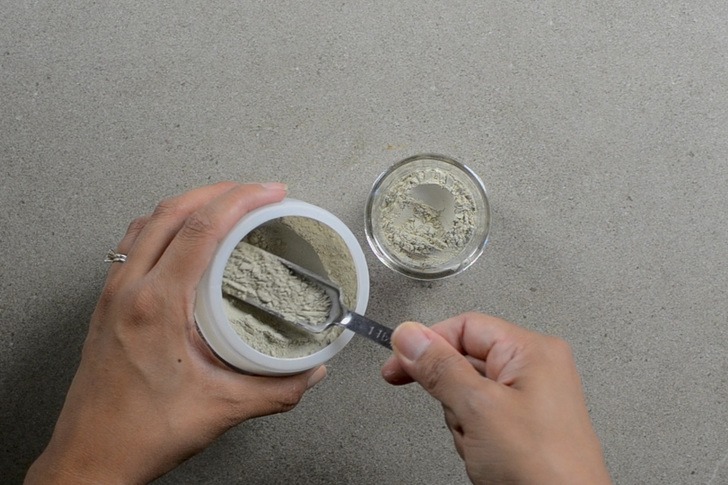
Add four tablespoons of bentonite clay powder to a 4 oz glass jar.
Typically it’s not advisable to use metal utensils when working with bentonite clay because the metals can leach from the utensil and be pulled into the clay. However, stainless steel has minimal effects on the clay. Plus, it’s not in contact with the clay for very long.
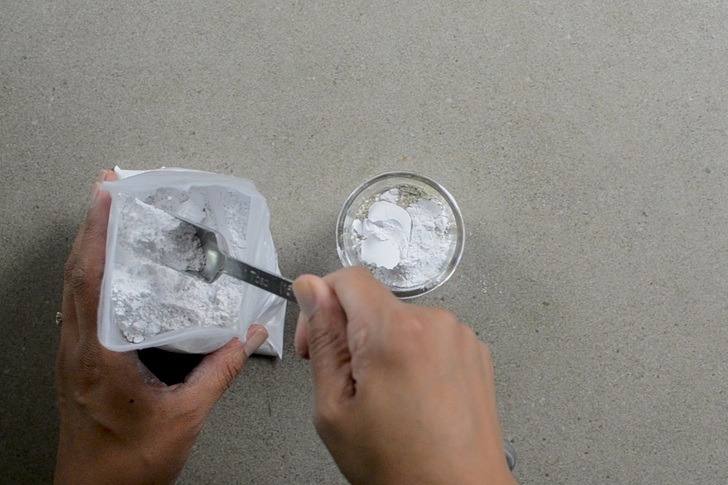
Next, add in two tablespoons of calcium carbonate powder to the clay.
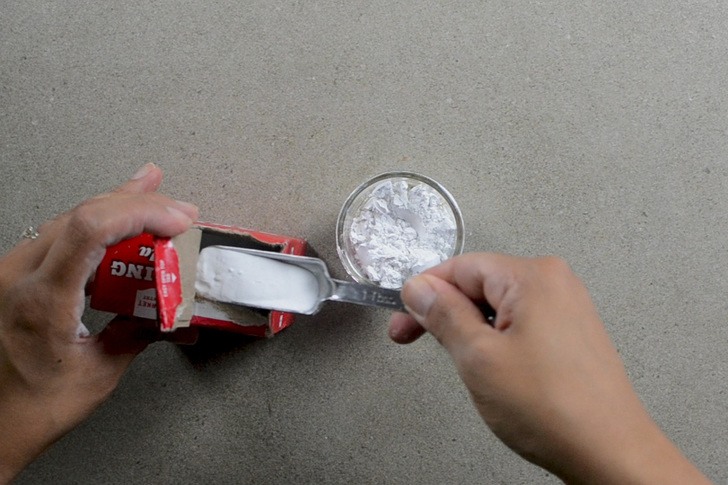
Then, add in one tablespoon of baking soda.
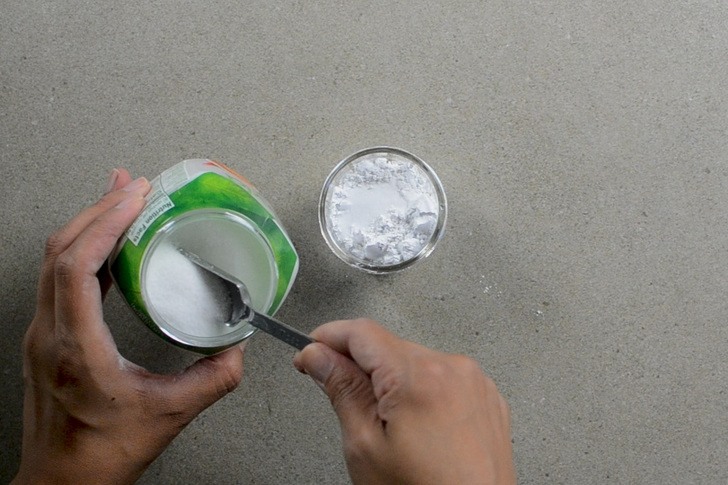
Optional: add in a tablespoon of stevia. Mix well.
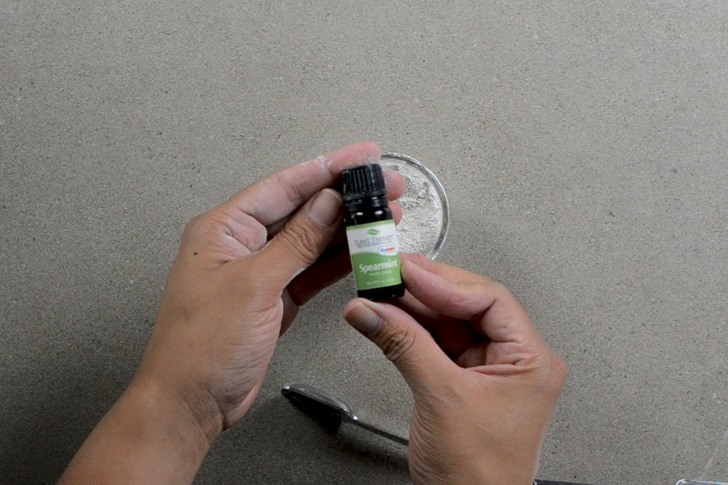
Finally, add in a few drops of spearmint or peppermint essential oil. Mix well.
To use, add a little to a wet toothbrush (or dip the brush into the jar) and brush as normal. Make separate jars of tooth powder for each family member to avoid cross-contamination.
6 More Natural Ways To Whiten Teeth
1. Oil Pulling
Due to its high lauric acid content, and appealing taste, coconut oil is a popular choice for the ancient oral health remedy known as oil pulling.
Swishing a tablespoon of coconut oil around in your mouth for 20 minutes per day can eradicate harmful bacteria and deeply clean gums and teeth. Anecdotal evidence claims that daily oil pulling can help brighten teeth and restore their pure white color.
Read Next: Activated Charcoal & Coconut Oil Pulling Tabs
2. Apple Cider Vinegar
This potent vinegar has been shown to have a bleaching effect on teeth, as well as antibacterial properties that contribute to oral health.
However, research also suggests that continued lengthy exposure to ACV may soften teeth. Limit use to once per week and avoid extended contact with teeth. Simply swish it around in your mouth for about 2 minutes before rinsing and brushing well.
3. Strawberries
Many people tout the use of strawberries as an effective whitening solution. Claiming that the malic acid present in these berries can reduce the appearance of surface stains on the teeth.
Smashing a strawberry and mixing it with baking soda may provide whiter teeth. Be sure to limit the use of this remedy to 1-2 times per week, as overuse could damage enamel.
4. Avoid Staining Drinks
Soda, red wine, coffee, and dark teas are all guilty culprits when it comes to staining teeth. Though it would be a crime to eradicate these beverages from your diet entirely, try limiting your exposure to them by drinking from a straw and brushing your teeth directly afterward.
If you experience heavy discoloration, it may be wise to cut down on the number of staining beverages you drink each week.
5. Hydrogen Peroxide
Hydrogen peroxide has long been used as a disinfecting agent for minor cut and scrapes. This disinfecting power can also be utilized to eradicate harmful mouth bacteria and bleach those pearly whites without damaging chemicals.
Use a diluted concentration, about 1.5-3% as mouthwash before brushing your teeth. Be sure to rinse thoroughly and limit use to once per week to avoid enamel deterioration.
6. Brush & Floss Regularly
Sometimes it can be easy to let dental hygiene fall by the wayside. Make a point to become diligent about brushing and flossing, as this is the most effective way to limit food buildup and staining.
Flossing cleans those hard-to-reach areas and prevents plaque buildup while encouraging healthy gums, and removing bacteria. Brushing polishes teeth and can fight bad breath.
Also, be sure that you are regularly scheduling dental cleanings to stay on top of your oral health, and avoid having to deal with issues down the line.
